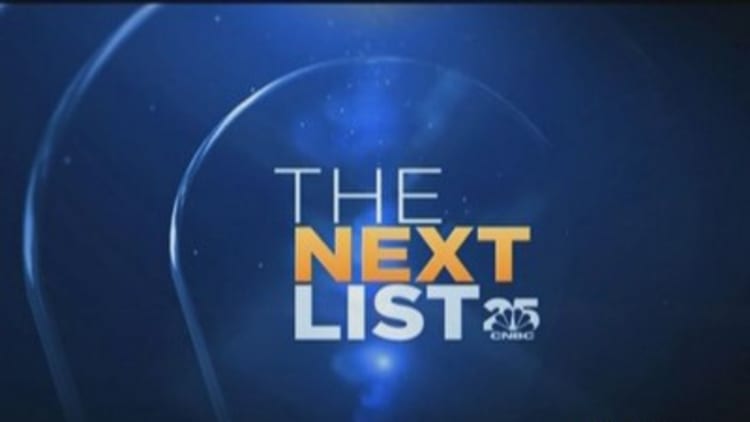Sandy Weill, Howard Schultz, even possibly Oprah wouldn't make it today. Three of the great disruptors of the past 25 years—all members of CNBC's First 25 list of leaders, icons and rebels that reshaped the past quarter century of business and finance—didn't have the elite education that marks the overwhelming majority of the generation that comprise our CNBC NEXT List of their counterparts who will shape the coming 25 years.
It is now more difficult than ever for self-taught self-starters that hone their skills on the shop or trading floor to ascend to the very top.

A knowledge-based economy like America's, in which technology drives innovation and new business, particularly needs skilled mathematicians, computer engineers and scientists of the highest order.
The NEXT List is studded with young entrepreneurs who are graduates and post-graduates in computer science and electrical engineering from the best universities. Following their lead are individuals with degrees in finance and economics, along with master's degrees in business administration.
Read MoreWho's not on the CNBC NEXT List?
Top executives, like Apple's head of retail Angela Ahrendts, a marketing major and Ball State University alumna who worked her way up through the fashion industry, are the exceptions, not the rule. Her boss, Tim Cook, also a public school alum (Auburn; industrial engineering) similarly worked his way up the ranks of IBM and then Compaq before joining Apple.
Mary Barra, head of GM, is sui generis among members of the NEXT List, in having gone through the carmaker's own technical college in Flint, Michigan (now Kettering University), where she rotated studying electrical engineering with working in GM plants.
Nurturing the minds of innovators
Scientific minds are honed at top universities but formed in homes where inquiring, schooled minds are nurtured at an early age and expectations of academic excellence set. If you don't get that start in life, the ascent to the top is now exponentially steeper.
Of the 153 bachelor's and master's degrees and doctorates awarded around the world to the members to the CNBC NEXT List, 99 of them are from universities, both public and private, that make the top 50 of the Times Higher Education World University Rankings. The total would top the 100 mark if the list was extended to the top 54 universities.
More remarkably, a third are from just three private U.S. institutions of higher learning—Harvard, Stanford and the Wharton School at the University of Pennsylvania.
Read MoreThese millennials are more successful than you
True, these are schools that can pick and choose from the best students in the world. They have the financial resources to offer the scholarships to secure their presence. And the best cluster with the best; you would expect such universities to produce more than their fair share of groundbreaking business leaders and entrepreneurs.
Stanford is the community college of America's entrepreneurial tech disruptors in Silicon Valley. Harvard is located in the second most fertile tech center in the U.S. Wharton is a recognized center of excellence for finance and economics. All three universities can also boast preeminent business schools that provide another nexus of connections, crucially to finance.
The educational attainments of the NEXT List reflect a recent Wealth-X and UBS Billionaire Census 2014 study from Swiss banking group UBS. It found that the 2,300 billionaires around the world are disproportionately likely to have gone to university. Almost two-thirds of them have at least an undergraduate degree. One in 4 have a postgraduate degree and more than 1 in 10 a doctorate.
The Ivy League fraternity
Hardscrabble backgrounds, while far from universal (Gates and Warren Buffett came from successful professional families), were more common among the CNBC First 25 than among the CNBC NEXT List. Starbucks' Howard Schultz grew up poor in the projects of the Canarsie section of Brooklyn, New York, his father, a truck driver losing his job after breaking a hip; Inditex's Amancio Ortega, a railway worker's son, grew up in humble circumstances in northwestern Spain, leaving school at 13 to help support his family.
But increasingly, admission to elite universities is becoming more selective, even in America, and successful candidates are often students that have been groomed by successful professional middle-class families. At an Ivy League college like Yale, two-thirds of a typical class year come from America's top economic quintile. That is not just a question of legacies who benefit from an admissions preference for applicants with family alumni ties.
As Caroline Hoxby of Stanford University and Christopher Avery of the Harvard Kennedy School noted in a Brookings Institute research paper published last year, "The Missing 'One-Offs': The Hidden Supply of High-Achieving, Low-Income Students": "The vast majority … of very high-achieving students from low-income families do not apply to a selective college or university." Even those that do, the authors find, are overwhelmingly likely to come from just 15 inner cities.
Hoxby and Avery outline the conditions supportive of high school students ending up at an elite university. These high achievers live in places that support selective high schools, where there is a critical mass of fellow high achievers and where it's likely to encounter a teacher who attended a selective college. In short, they come from an affluent background.
Take a random trio from the younger part of the NEXT List. Pinterest's Ben Silberman is the son of two opthamologists and a Yale graduate. Uber founder Travis Kalanick is the son of an engineer and attended UCLA. Theranos chief executive Elizabeth Holmes is the daughter of a senior officer in government service and a Congressional committee staffer. She attended Stanford.
Like Harvard dropout Bill Gates before them, Kalanick and Holmes chose to pursue their entrepreneurial dreams over completing a degree. Both quit college after a couple of years. But they got in to a top university in the first place. Had they come from working-class homes, it is far less certain that they would have had the opportunity to let their talents bloom than if they had been born a quarter of a century earlier.
Read MoreFrom no grid to constantly connected
Most crucially, those talents took them to elite academic institutions, the places where, as Frank Freudi, emeritus professor of sociology at the University of Kent in the U.K., claims, "the global players gather."
—By Paul Maidment, special to CNBC




